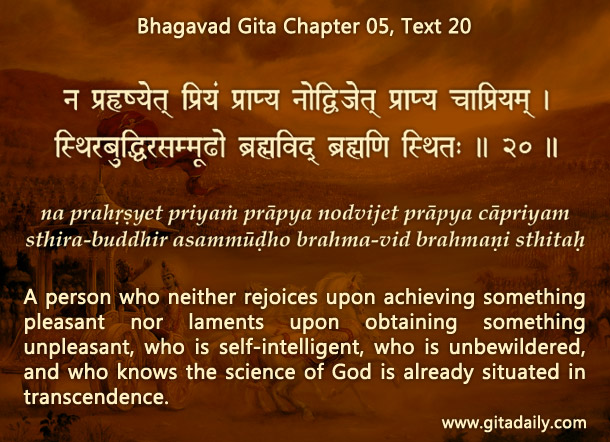In today’s fast-paced world characterized by sudden and massive changes, we often appreciate people who stay cool-headed. How can we too develop such equanimity? Do we need to give up all emotions? But aren’t emotions such as love what bring meaning and fulfillment to our life?
Addressing such concerns, Gita wisdom offers us a way to equanimity that is both philosophical and pragmatic. At a philosophical level, the Gita explains that we all are parts of an all-attractive divine, Krishna. He is our unchanging Lord who exists both transcendentally beyond this world and immanently within our hearts. If we connect with him through spiritual love or bhakti, we can find life’s deepest meaning and greatest fulfillment. At a pragmatic level, the Gita points to many practical activities that can connect us with Krishna. By internalizing a spiritual self-understanding and engaging in devotional activities, we develop a strong devotional connection that raises us above the world’s dualities. Here’s a metaphor to illustrate.
Suppose someone has fallen into an ocean. They cannot but be tossed by the ocean waves. But if they get aboard a boat and hold a lifeline provided by an overhead helicopter, they won’t be that disturbed by the waves. Similarly, engaging in bhakti activities is like getting on a boat, and strengthening our intention to serve transcendental Krishna is like holding a lifeline — both these decrease our vulnerability to the world’s unpredictability and the mind’s volatility. Pertinently, the Bhagavad-gita (05.20) states that we can avoid being elated by desirables and dejected by undesirables when we are situated in spiritual knowledge and realization.
Thus, we develop equanimity not by eliminating or repressing emotion, but by developing a higher connection that is energized by divine love.
One-sentence summary:
Equanimity does not require the elimination of emotion; it requires the subordination of emotion to intention.
Think it over:
- In cultivating equanimity, how can Gita wisdom help us philosophically?
- In cultivating equanimity, how can Gita wisdom help us pragmatically?
- How can equanimity and emotion co-exist?
***
05.20: A person who neither rejoices upon achieving something pleasant nor laments upon obtaining something unpleasant, who is self-intelligent, who is unbewildered, and who knows the science of God is already situated in transcendence.
To know more about this verse, please click on the image
Explanation of article:
Podcast:


Hare Krishna… thank you so much for this. I was actually just reading chapter 5 today and came across this verse.
Happy to know that this aided you in your Gita study.
JAPA sails you through the Life.
Hare krishna… It this related to stithpragya
Yes, precisely.